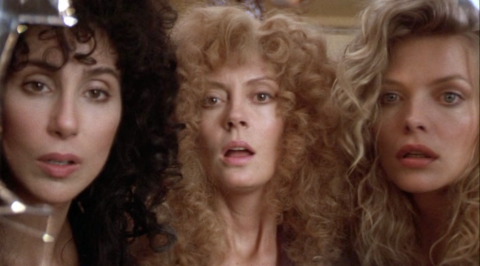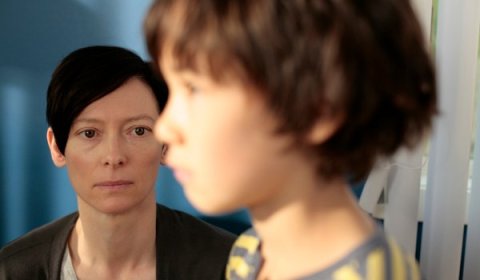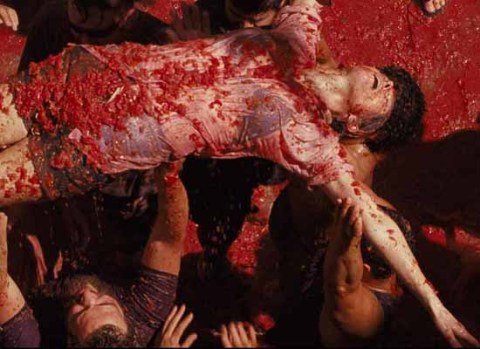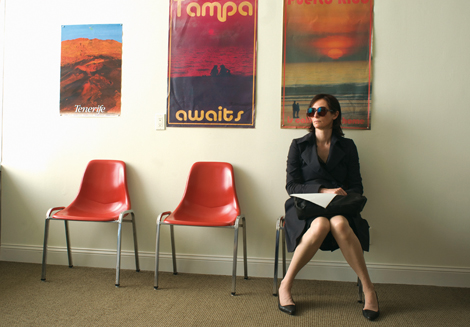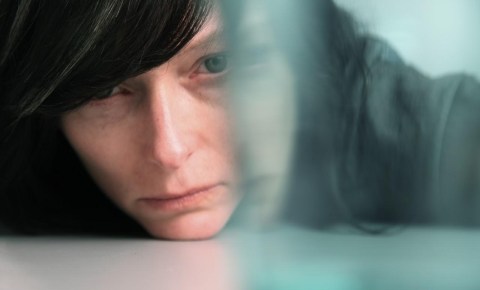The movies I turned off, or walked out of
31 May 2012
Hot Tub Time Machine. Survived 20 minutes. So horrible I ceased to care whether it might get better. Oh, John Cusack, what happened to the Tapeheads days?
 Julia. Tilda Swinton is always good in the depressive, self-loathing mode she mastered for films like We Need to Talk About Kevin, but she rarely appears as she does in Erick Zonca’s 2009 film: as a manic, beautiful alcoholic forestalling self-loathing with as many drinks as possible. But as riveting as she is, this film was unbearable to watch — the tale is so dark, and her character is on such a bleak downward spiral. Survived 35 minutes.
Julia. Tilda Swinton is always good in the depressive, self-loathing mode she mastered for films like We Need to Talk About Kevin, but she rarely appears as she does in Erick Zonca’s 2009 film: as a manic, beautiful alcoholic forestalling self-loathing with as many drinks as possible. But as riveting as she is, this film was unbearable to watch — the tale is so dark, and her character is on such a bleak downward spiral. Survived 35 minutes.

Ten. I want to like Abbas Kiarostami’s films more than I really do; I’m somewhat baffled by my annoyance. I was only able to make it through 15 minutes of this 2002 film, which apparently traces a single Iranian woman chauffeuring passengers in her car all over Tehran (with the camera positioned directly in front of the windshield, often in very long shots). The first scene, in which her son behaves badly and brattily during their ride, simply left me thinking, “Can I stand this for 5 more minutes, much less 94 more?”
Oldboy. But that’s because the Netflix version was dubbed (and badly): survived only 3 minutes. I can hardly wait to see the subtitled version. And the American remake.
The Witches of Eastwick. What’s not to like about Susan Sarandon and a story about witches? I asked myself when I turned it on. Then I discovered what not to like: Jack Nicholson in his Jack phase (ca. 1987), an impressively stupid plot, and the worst directing ever by George Miller.
Ugh. Even making a list like this puts a bad taste in my mouth. Let’s cleanse our palates with an example of how to write an Oscar-winning film, shall we? Courtesy of Cracked:
[Appreciative laughter; murmured approval; catch-phrase.]
We’ve all seen it before: the 2-yr-old is standing in the middle of the room screaming his head off. His face is red, his hands balled into comical little fists. His mother and I stare at him with a kind of exhausted paralysis. She looks at me and says flatly (and funnily), “Oh, the maternal ambivalence.” This takes place years before either of us was aware of We Need to Talk About Kevin, either book or film. Now I wish I’d seen the film with her — I can’t imagine how interesting our post-viewing debriefing could have been, how much more I could have learned from that conversation.
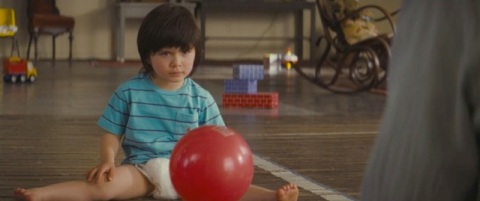 “Maternal ambivalence” isn’t just the right statement in a situation like when your kid has one of those histrionic meltdowns; it’s the only one to mitigate the maternal sense of failure and the simultaneous balking at calling it “failure.” If your kid behaves horribly, impossibly, inconsolably, how do you as his mother evade the sense that you ought to apologize for his awfulness, as if it’s your fault? How do you know it’s not your fault — in fact, isn’t it sort of your fault? How do you stop feeling implicated in the mini-psychodramas of a 2-yr-old – who, frankly, is probably going to act out no matter what you do? How do you help but feel that when they’re in this state, a 2-yr-old is often a kind of little animal with no reason and certainly no manners, and therefore out of your control?
“Maternal ambivalence” isn’t just the right statement in a situation like when your kid has one of those histrionic meltdowns; it’s the only one to mitigate the maternal sense of failure and the simultaneous balking at calling it “failure.” If your kid behaves horribly, impossibly, inconsolably, how do you as his mother evade the sense that you ought to apologize for his awfulness, as if it’s your fault? How do you know it’s not your fault — in fact, isn’t it sort of your fault? How do you stop feeling implicated in the mini-psychodramas of a 2-yr-old – who, frankly, is probably going to act out no matter what you do? How do you help but feel that when they’re in this state, a 2-yr-old is often a kind of little animal with no reason and certainly no manners, and therefore out of your control?
I’m hardly the first to notice that ours is a particularly hysterical culture when it comes to blaming mothers, mothers blaming themselves. I’d go so far as to say that ambivalence is a healthy response to the schizophrenic messages about what motherhood is supposed to be. With that in mind, however, let me say: We Need to Talk About Kevin is not for the faint of heart.
What you realize while watching Lynne Ramsay’s film is that we never seen representations of mothers who feel riddled by ambivalence. Dads? Sure. As bracing as Louis C. K.’s humor about being a bad parent can be, it’s popular, socially acceptable, hilarious. Mothers don’t get the same leeway. Moms are supposed to be happy, well-adjusted, delighted with their children. Pregnancy is supposed to make women glow. Motherhood, we hear all the time, is supposed to draw out women’s “natural” self-sacrificing tendencies. Good mothers, we learn, raise good children.
But then there are those dark exceptions. What about that mother who drowned all her children? Whose fault is it if your kid is a bully or a mean girl? Worst of all: when a kid kills fellow students in a school shooting rampage, who do you blame? These are some of the dark questions We Need to Talk About Kevin explores.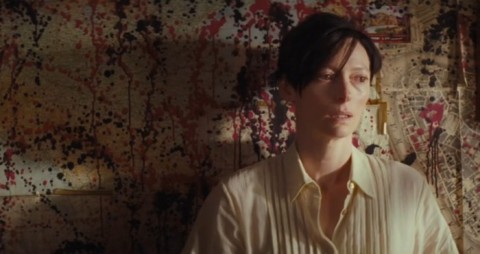
Eva (Tilda Swinton) wasn’t always so ambivalent. As a travel writer, she can remember some pretty transformative, ecstatic experiences; she’s not given to depression. There was that one time when she crowd surfed during that tomato festival, when she and everyone else was drenched in smashed tomatoes. You have to look carefully at first to see whether she’s hysterical or elated.
She experienced sex that night with the same giddy elation. Franklin (John C. Reilly) asked if she was sure she wanted to go without the condom — and she said yes, she was sure. For a moment there, she wants to be pregnant and knows perfectly well that their drunken, happy sex might get her there.
The actual experience of pregnancy is something else again. All those other blissful and very pregnant women stretch and happily rub their enormous bellies in the locker room of the Y after that prenatal yoga class, while Eva looks glum. She walks out of the gym amidst a stream of giddy six-yr-old ballet students and is unmoved by their pink tutued effervescence.
It doesn’t change after the birth. She doesn’t want to be this way — she just is. Even worse, he’s a colicky baby, screaming constantly. It’s even worse when she realizes that the baby quiets down the minute Franklin gets home, confirming his belief that Eva has over-reacted to the baby’s fussiness. All of this makes her feel guiltier. She’s a bad mother for not liking that baby more … but his screaming makes it all the harder. Even a jackhammer is preferable to that scream.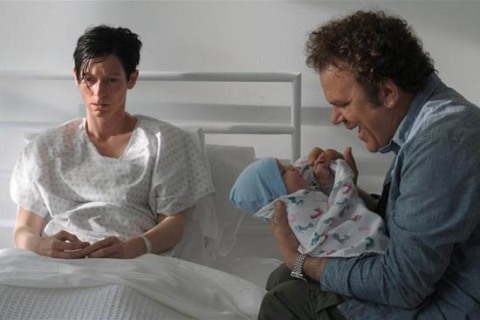
Look at Franklin with his son. He’s delighted. He functions as the quintessential, bright-sided American optimist. Everything’s great! And the baby responds in kind: Franklin’s presence is a balm to little Kevin. Every time his father appears, Kevin transforms into a different child.
What’s wrong with her? Is she responsible for his awful aggression? Yet she can’t help but think there’s something wrong with this child — really wrong. And when she says “something wrong,” she invokes that little kernel of anxiety that keeps you wide awake, heart pounding, at 3am with worry about what that something might be. She takes the toddler to the doctor, who gives him an unequivocal thumbs up. Whew — right?
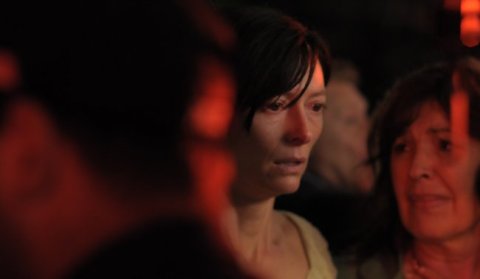
The film ultimately makes a surprising move. Seen through Eva’s eyes, we have no doubt that Kevin is a sociopath — a brilliant, manipulative, unfeeling monster. But the film doesn’t let Eva off the hook (just as she never lets herself off). Nor is this a self-flagellating move. The film does something amazing, disturbing, revelatory: it shows that although she may not be responsible for Kevin’s psychosis, the crazy intimate antagonistic fucked-upness of their mother-son relationship is, in fact, at the very center of Kevin’s choices about acting out. Insofar as he wants, above all else, to keep her engaged with him — to provoke her out of her maternal ambivalence and malaise — she is, in fact, partly responsible, and she will never get over it.

In addition to offering us this creepy, awful realization, however, Lynne Ramsay’s film is a sustained critique of the crazy cultural contradictions we hurl at mothers all the time. Those reality shows filled with problematic children and terrible parenting — parents who cede authority to a stranger who shames them on network TV. State laws that not only permit potential employers to ask women whether they’re mothers, but which view motherhood as a “problem” for a woman doing the job (mothers are disproportionately discriminated against in hiring and promotions, and pay a “mommy penalty” in lower wages for the rest of their careers). Draconian new laws designed to criminalize “bad” mothers even when the science of such determinations is sketchy at best — these are just tips of the iceberg of schizophrenic ways that American mothers are simultaneously put on pedestals and punished. Google “mommy wars” and you’ll find infinitely more chaos.
Early on in the film Eva walks out of a job interview, feeling uncharacteristically good. As she approaches a couple of very well-heeled middle-aged women she knows, she begins to smile to greet them. One of them reaches up and smacks Eva, hard, across the face.
A man rushes up behind the stunned Eva to help, to call the cops, to do something. “No, no, no … it was my fault,” she assures him. At first this seems like the craziest, most masochistic statement you can imagine.
The thing is: she really believes it. And our culture put her there. This utterly memorable, haunting, scathing film will not let you believe those questions about nature vs. nurture, innocence vs. guilt, or good mothers vs. demon mothers are simple ones. You’ll leave this film feeling like you’ve been smacked, too.
And yet there’s something about the ending that feels … do I dare say it feels like a change in the air? Not revelation, not transformation, but something new. Please watch We Need to Talk About Kevin and tell me what you think. I for one can’t stop thinking about it.
Possible solutions to the problem of access
9 February 2012

don't mistake the Golden Globe statuette for some kind of sex toy. Or, in the state of Texas, an "educational model."
I mentioned yesterday that in my quest to see a couple of highly-respected art-house films, I’m willing to drive two hours across the state. I understand perfectly that I don’t live in an urban hub with art-house cinémas. But these films aren’t showing in Boston or in any of the other urban areas within two hours of home. Hence, I ranted about limited release, a problem I see as two-fold: I can’t see great film, and great films don’t get my money.
So here’s a solution: some version of Pay Per View. Each filmmaker eager for their film to be considered for award nominations must prove, at least one month before the nominees are chosen, that the film will be accessible to all viewers by the time of that awards show. Filmmakers can give evidence of access either by the usual means (wide release in theaters or, for films released earlier in the year, a DVD) or, for late-year releases, commitment to some form of widely-available Pay Per View — iTunes, Amazon streaming video, cable television, or an independent website (aka the Radiohead/independent music solution), or all of the above.
Thus, in order for the makers of We Need to Talk About Kevin to get its star, Tilda Swinton, nominated for Best Actress for the Golden Globes, they would have had to commit to some form of wide release by November 15, a month before the nominees are chosen. The films’ actual releases would have to occur at least one week before the awards show (December 8 in the case of the Golden Globes) with the idea that ordinary viewers would have the chance to see it beforehand.
If filmmakers cannot guarantee this release, the film will be forced to compete during the following year, when the film is available widely (presumably via DVD).
In other words, this strategy seeks to offer a middle period for award-worthy films in between very limited theater releases and wide DVD release. In that period, filmmakers can reap the benefits of wide viewership — and don’t directors really want people to see their films? — and producers can reap additional financial rewards of extra tickets sold. Streaming a film for $5.99 online is a huge attraction to me, especially if my only other option is to drive to Boston and pay $12 for a theater ticket.
There are precedents for such a move — precedents that have proved both highly profitable and great for public access. After shopping his film Red State (a fictionalized tale of a Fred Phelps-type radical Christian homophobic movement) around in the festival circuit, director Kevin Smith took his own film on the road — the 15-city Red State USA Tour. Smith’s SModcast Pictures says it spent less than $500 in advertising to support the tour, relying instead on reviews and word of mouth to encourage attendance. This decision was stunningly (and quietly) successful: it topped the per-screen average charts for three weekends, making it the highest per-screen average film of the year and the ninth-highest per-screen average film of all time, according to SModcast.
After this taking-it-to-the-streets road tour during the spring of 2011, Smith released the film in September via several online platforms, including iTunes and cable television. Now, several months later, it’s available streaming via Netflix for ordinary subscribers.
Independent musicians have used this method for years now, largely as a protest against the exploitative music industry that reserves most profits for non-artists. It’s a method made most famous by Radiohead’s In Rainbows (2007) which they released via an independent website as a digital download for which customers could set their own price. Guitarist Ed O’Brien reported of this strategy that “We sell less records, but we make more money.” Later, the band released the album in ordinary CD format at regular prices to critical and chart success.
Look, I want to see film, especially those films I’ve been hearing about for eight, nine, or ten months due to early festival screenings. I’m willing to pay to see film. But at least in terms of a few like Coriolanus and We Need to Talk About Kevin, there’s nothing I can do to see them (well, except buy a ticket to New York). These films are getting neither my viewership nor my dollars. You’d think these producers and directors would be at the forefront of experiments in change.
…in which Feminéma rants about access
8 February 2012
Perhaps you’re thinking, “where the hell is Part II of the La Jefita awards? What kind of an anonymous blogger gets me all excited about seeing a list of top films by and about women, then doesn’t tell me which one wins for Most Feminist Film?” Well, you’re not the only one who wants to rant.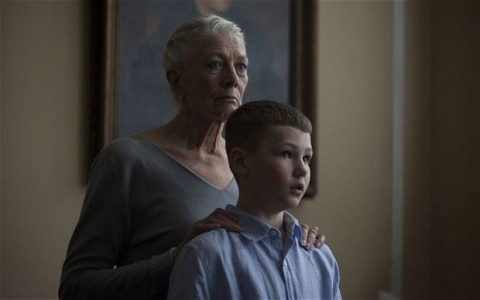
I wanted to consider several 2011 films for these awards, most notably Lynne Ramsay’s We Need to Talk About Kevin (Tilda Swinton, I love you) and Ralph Fiennes’ Coriolanus (so I can see Vanessa Redgrave kick the shit out of the mother stereotype), but the fact is, I can’t see them. I waited and waited, and checked showtimes everywhere within approximately 120 miles. Even if I drove all the way to Boston I couldn’t see them, because they’re not playing there, either. I don’t know what kind of moron is running those distribution companies, but if you can’t get your award-worthy film into a major American city like Boston by mid-February, you’re fucking useless.
Ahh, that feels better.
Now that I’ve ranted, and now that I’ve come to grips with the fact that I’ll have to put these films into my 2012 category (argh!), I’m prepared to re-jigger my finalists and finish this post — once I get the chance to see whether Gina Carano’s ass-kicking in Haywire is superior to The Girl With the Dragon Tattoo‘s or Hanna‘s. So, friends, you can be sure to catch this post by the weekend.
Here’s the thing about Best-of-the-Year lists: people like me haven’t seen half the motherfucken films because we live in Regular America, where they dribble great indie films out to us as if they’re rare commodities that only goddamn Newyoricans and Angelenos get to see.
This is too bad, because I’ve just invented the soon-to-be-coveted La Jefita statuette, to be awarded sparingly and only in person by me to artists of my choosing.
When I finally get a crack at these films of which I have heard so much good stuff, I have a big plan for categories of:
- Best Feminist Film (will it be Girl With the Dragon Tattoo??)
- Best Female-Directed Film (once I get the chance to see We Need to Talk About Kevin and Pariah, dammit)
- Best Female-Oriented Film (will it be Poetry?? or will Hanna or The Lady edge it out? is it even possible I could see Kenneth Lonergan’s Margaret??)
In my heart of hearts, I’d also like to add far more idiosyncratic categories like:
- Most Feminist Period Drama That Avoids Anachronism
- Sexiest Scene in Which a Woman Eats Food
- Best Fight Scene in Which A Woman Kicks a Man’s Ass
- Most Realistic Dialogue That Women Might Actually Say
- Best Role for a Veteran Actress Who Is Not Helen Mirren or Meryl Streep
Stay tuned on that one. I have to gird myself for controversy.
Only one award is ready to be given: BEST ACTRESS! Because no other performance by an actress can possibly beat out Joyce McKinney — as herself — in Errol Morris’s Tabloid.
She’s amazing! Is she BAT-SHIT CRAZY or BARKING MAD, the way one tabloid journalist portrays her? or a hopeless romantic, which is how she describes herself (and how she seems to have lived her life)? Does she really have a genius-level IQ? What really happened in that cottage in Devon in 1977? And who’s been threatening bloggers like me with lawsuits ever since the documentary was released?
Joyce McKinney is riveting, beautiful, clever, and unforgettable. I don’t care if it was a documentary: McKinney is playing the part of McKinney, and she’s doing it brilliantly.
Congratulations, Joyce — you are the first-ever winner of Feminéma’s marble La Jefita statuette!
A moment from “Ratcatcher” (1999)
24 May 2011

She’s sticking her tongue out here, but half a second later she’ll be giggling affectionately like she always does. Of all of them, his little sister has probably adjusted best — she doesn’t mind the frequent checking for lice in their hair, and she’s too young to be harassed by those older boys, the ones who threw Margaret-Anne’s glasses in the canal. It’s Glasgow, it’s 1973, and the garbage strike is on, so bags of garbage and rats are everywhere in the council estate. How much longer will Anne-Marie (Lynne Ramsay Jr.) possess that innocence, before she becomes as haunted as her brother James?
A beautiful, sad, brilliant film by Lynne Ramsay — her first full-length feature, and winner of 11 prizes. I was inspired to watch it after reading ecstatic reviews of Ramsay’s latest, We Need to Talk About Kevin (2011), which just screened at Cannes. Can hardly wait.
